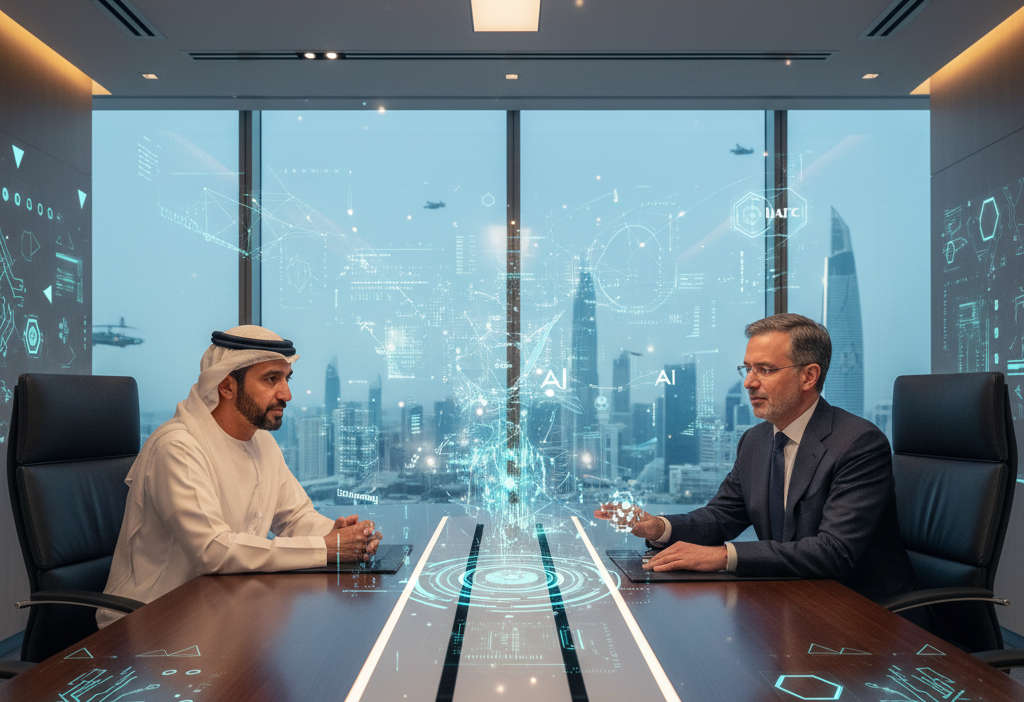A Meeting Signaling AI Ambition
In a significant development for the Middle East and global AI landscape, the UAE President held talks with OpenAI CEO to explore collaboration in artificial intelligence. This high-level engagement is part of the UAE’s broader strategy to position itself as a global leader in AI research and innovation.
Such discussions are more than symbolic gestures—they represent a pragmatic approach toward leveraging global AI expertise to drive economic growth, enhance public services, and create long-term societal impact. For policymakers, tech enthusiasts, and businesses worldwide, this meeting underscores the UAE’s intent to adopt AI responsibly, strategically, and efficiently, shaping a model for other nations to follow.
The Strategic Significance of the Meeting
UAE’s Vision for AI Leadership
The UAE has consistently demonstrated ambition in AI adoption. Initiatives like the UAE AI Strategy 2031 and the appointment of the world’s first Minister of State for Artificial Intelligence highlight the nation’s commitment to technological leadership. By engaging with OpenAI, the UAE gains access to cutting-edge AI research and tools, which could accelerate its transformation into a regional hub for AI-powered solutions.
OpenAI’s Role in Global AI Development
OpenAI, a global leader in AI innovation, brings expertise in generative AI, machine learning, and ethical deployment. Partnering with the UAE allows OpenAI to extend its reach into practical, large-scale applications, from smart cities to healthcare, while contributing to a framework for safe and responsible AI adoption. This collaboration represents a bridge between innovation and real-world implementation.
Economic and Technological Implications
Strategic partnerships with AI leaders can have significant economic benefits. For the UAE, working closely with OpenAI could drive job creation, attract international talent, and foster AI-driven startups. Technology adoption also strengthens the nation’s competitive advantage, ensuring it remains at the forefront of digital transformation in the Middle East.
Areas of Potential Collaboration
Smart Cities and Urban Planning
AI can revolutionize urban development by optimizing traffic flows, energy efficiency, and public safety systems. Collaboration with OpenAI could enable predictive analytics, resource optimization, and real-time decision-making in urban management, making cities smarter and more sustainable.
Healthcare and Life Sciences
Artificial intelligence has the potential to enhance diagnostics, predict disease outbreaks, and personalize treatment plans. Through this partnership, the UAE could implement AI solutions that improve patient outcomes while reducing operational costs for healthcare providers.
Education and Workforce Development
AI-driven educational platforms can enhance learning experiences, teacher support, and skill development. Collaboration with OpenAI could empower students and professionals in the UAE to acquire AI and data literacy skills, preparing the workforce for the demands of a future driven by technology.
Government and Public Services
AI can streamline government operations, automate routine tasks, and provide data-driven insights for policy-making. By integrating OpenAI solutions, the UAE can enhance efficiency, transparency, and citizen satisfaction in public service delivery.
Benefits of the Collaboration
-
Accelerated Innovation: Leveraging OpenAI’s tools can speed up research and development in multiple sectors.
-
Global Leadership: The UAE strengthens its position as a hub for AI innovation, attracting international collaboration.
-
Economic Diversification: AI initiatives can stimulate high-tech industries, entrepreneurship, and knowledge-based growth.
-
Ethical AI Implementation: The collaboration ensures AI is deployed responsibly, mitigating risks associated with bias, privacy, and misuse.
Challenges and Considerations
Despite the benefits, several challenges exist. Data privacy and security remain critical, requiring robust frameworks to protect sensitive information. Compliance with international regulations and ethical standards is also essential. Additionally, developing local expertise is crucial for sustainable AI adoption, ensuring that UAE citizens can effectively operate and innovate with these technologies. Societal impacts, including changes in employment and workforce dynamics, must also be carefully managed.
Around the world, countries are forming strategic AI partnerships to maintain technological competitiveness. Singapore leverages AI for smart nation initiatives, the EU emphasizes ethical AI regulations, and the US focuses on AI safety and research collaboration. The UAE’s engagement with OpenAI reflects a broader trend where governments and tech leaders co-create AI solutions that balance innovation with societal benefit.
FAQs
1. Why is the UAE prioritizing AI?
To drive economic growth, technological leadership, and societal benefits across healthcare, education, and public services.
2. What does OpenAI contribute?
Expertise in AI research, generative models, ethical deployment, and real-world applications.
3. How will citizens benefit?
Through improved healthcare, education, public services, and smart infrastructure.
4. Could this foster AI startups in the UAE?
Yes, the partnership can stimulate entrepreneurship and innovation hubs.
5. What ethical considerations exist?
Privacy, transparency, fairness, and responsible AI use are key priorities.
6. Is this part of a global trend?
Yes, governments worldwide are forming partnerships with AI leaders for innovation and competitive advantage.
7. How does this affect global AI development?
It promotes international collaboration, best practice sharing, and safe AI deployment strategies.
8. What is the long-term vision?
To establish the UAE as a global hub for AI innovation, research, and responsible application benefiting citizens and businesses alike.
Stay Ahead in AI Innovation:
Subscribe to our newsletter for insights on AI collaborations, emerging technologies, and global trends shaping the future.
Note: All logos, trademarks, and brand names referenced herein remain the property of their respective owners. The content is provided for editorial and informational purposes only. Any AI-generated images are illustrative and do not represent official brand assets.


